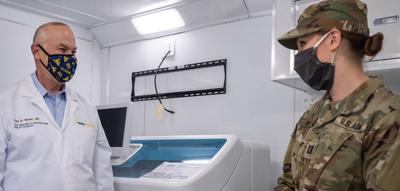FAIRMONT — State and local officials warn that West Virginia’s COVID-19 case numbers are likely higher than they appear on paper.
At the start of June, West Virginia pulled the National Guard from their testing sites and moved out of the way to allow private and local entities to take over the work of day-to-day COVID testing.
The Marion County Health Department ceased offering free testing and now works on an insurance-based system, however there are still plenty of free options for COVID testing.
Wednesday, during his regular COVID briefing, Gov. Jim Justice defended pulling away the National Guard.
“We don’t want to throw money away, do we? We don’t need to have the National Guard sitting out there for a week and only three people show up,” Justice said. “At the end of the day, that purpose was served and surely if we had a really bad outbreak, we could bring that back.”
Currently, West Virginia’s case numbers are at some of their lowest since the pandemic began but are slowing creeping upward.
However, with the advent of at-home COVID tests, many positive cases go unreported and the governor’s COVID Czar Clay Marsh says that is something all the staff are keenly aware of as they navigate this lull in cases.
“A study from New York City said that we may be underestimating the number of daily cases by as much as 30 times, which means we may have as many as 3 million new cases in our country a day,” Marsh said. “That is concerning, because we know our oldest population is bearing the brunt of these new variants and subvariants.”
In any case, hospitalizations due to COVID are down remarkably compared to the highs experienced in the winter. Currently there are 188 hospitalizations compared to the previous peak of 1,097 in February.
Across the state, there are just over 2,000 active cases and the state is just three deaths shy of the 7,000th West Virginia COVID fatality.
In Marion County, cases have remained sparse, but Health Department Administrator Lloyd White is cautious of trends he’s seeing.
“Our case counts come in daily, and we range anywhere from 5 or 6 all the way up to 40 cases,” White said. “We’re up and down like a yo-yo, but these last two weeks, we’ve steadily averaged 16-20 cases a day, so we are seeing an increase in case counts, which is troubling.”
As numbers start to rise, and research about the long-term effects of COVID is published, Marsh warns the public about what has come to be called “long COVID.”
According to Marsh, those who have had COVID are shown to be more susceptible to blood sugar control issues, even when the patient’s bout with COVID was mild.
“It is important to recognize that even people with normal body weights and had no trouble with diabetes before COVID-19 infection, they can be at risk for diabetes after infection,” Marsh said. “As we’ve said before, vaccination does reduce your risk of long-term COVID symptoms, so we’re still encouraging that.”
White agreed and said the public should continue to be mindful at the very least and stick to the tactics that are proven to work.
“We still want to encourage folks to get vaccinated. Outside of that, continue to do the things we know work,” White said. “Handwashing, cough and sneeze etiquette, sanitizing surfaces... and when you go to crowded areas, it’s still OK to wear a mask.”














Commented
Sorry, there are no recent results for popular commented articles.